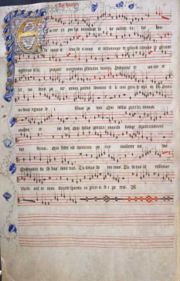
Roy Henry
Encyclopedia

England
England is a country that is part of the United Kingdom. It shares land borders with Scotland to the north and Wales to the west; the Irish Sea is to the north west, the Celtic Sea to the south west, with the North Sea to the east and the English Channel to the south separating it from continental...
composer, almost certainly a king of England, probably Henry V
Henry V of England
Henry V was King of England from 1413 until his death at the age of 35 in 1422. He was the second monarch belonging to the House of Lancaster....
, but also possibly Henry IV
Henry IV of England
Henry IV was King of England and Lord of Ireland . He was the ninth King of England of the House of Plantagenet and also asserted his grandfather's claim to the title King of France. He was born at Bolingbroke Castle in Lincolnshire, hence his other name, Henry Bolingbroke...
. His music, two compositions in all, appears in a position of prominence in the Old Hall Manuscript
Old Hall Manuscript
The Old Hall Manuscript is the largest, most complete, and most significant source of English sacred music of the late 14th and early 15th centuries, and as such represents the best source for late Medieval English music. The manuscript somehow survived the Reformation, and until 1873 belonged to St...
.
Musicologists have not been able to agree on which English monarch wrote the two mass
Mass (music)
The Mass, a form of sacred musical composition, is a choral composition that sets the invariable portions of the Eucharistic liturgy to music...
movements which appear, at the head of their respective sections, in the Old Hall Manuscript. Henry IV, who reigned from 1399 to 1413, was in his early forties when the music was most probably written, since stylistic evidence places it around 1410. That he was still mentally able at this period, and had leisure time to think and design, is clear from his payment for the metal used in the construction of a cannon made to his own design in 1409 (see Mortimer, Fears of Henry IV, pp. 319-20). In addition, there is more evidence of his being an accomplished musician than his son. One contemporary referred to him as a 'sparkling musician'; he obtanied the first known recorder and both he and his wife played the harp. (His accounts record a number of payments for harp strings: see Mortimer, Fears of Henry IV, pp. 46-7). As Henry V was so busy after his accession - and abroad on campaign continually from 1417 - the sacred composition falls more naturally into his father's twilight years than the son's martial ones. Two other reasons suggest the father as the composer: one would have expected clarification of the name if it had been the second of the two King Henrys; also the connection of the manuscript with the duke of Clarence suggests Henry IV, as Clarence and Henry V were not close whereas Clarence was his father's favourite son.
Henry V, who reigned from 1413 to 1422, was known to have cultivated music in his youth. An early biography of Henry V states:
…he was in his youth a diligent follower of idle practices, much given to instruments of music, and fired with the torches of Venus herself.
Recent research has shown that work on the Old Hall Manuscript probably ceased on the death of Thomas, Duke of Clarence, in 1421. Since Thomas was King Henry V's brother, and his chapel's musicians are now known to have included Leonel Power
Leonel Power
Leonel Power was an English composer of the late Medieval and early Renaissance eras. Along with John Dunstaple, he was one of the major figures in English music in the early 15th century.-Life:...
, and the manuscript itself passed to Henry V's chapel on the death of Thomas, some people favor Henry V as the identity of Roy Henry. Obviously the manuscript could not have been passed to the long-dead henry IV at this time, so this is not a conclusive argument. But it is worth noting that Henry V's extraordinary piety - outdoing even his father in matters of religion - is consistent with the composition of sacred music, and we can be sure of his musical education. It is impossible to say for certain which man was the composer without further evidence.
Roy Henry's music consists of two movements of the ordinary
Mass (liturgy)
"Mass" is one of the names by which the sacrament of the Eucharist is called in the Roman Catholic Church: others are "Eucharist", the "Lord's Supper", the "Breaking of Bread", the "Eucharistic assembly ", the "memorial of the Lord's Passion and Resurrection", the "Holy Sacrifice", the "Holy and...
of the mass: a Gloria and a Sanctus, both for three voices, and written in a fairly low register. The music itself is skillfully written, and unusually for the time, no specific plainchant can be identified as a source; both pieces may be freely composed, or the underlying chant may be part of the enormous lost repertory of music from the early 15th century, hence unidentifiable (the vast majority of manuscripts of the time were destroyed in the 1530s during Henry VIII
Henry VIII of England
Henry VIII was King of England from 21 April 1509 until his death. He was Lord, and later King, of Ireland, as well as continuing the nominal claim by the English monarchs to the Kingdom of France...
's Dissolution of the Monasteries
Dissolution of the Monasteries
The Dissolution of the Monasteries, sometimes referred to as the Suppression of the Monasteries, was the set of administrative and legal processes between 1536 and 1541 by which Henry VIII disbanded monasteries, priories, convents and friaries in England, Wales and Ireland; appropriated their...
).

